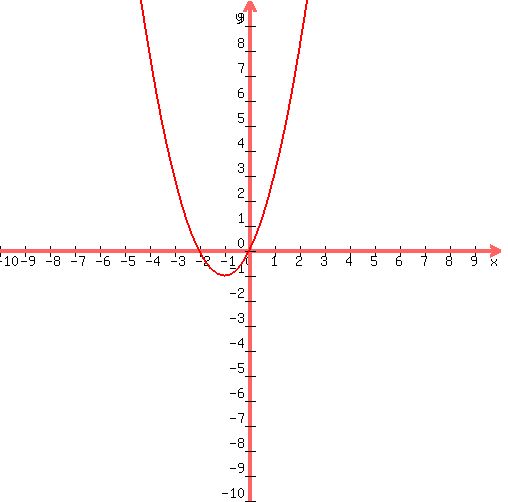|
Question 84539: Write the equation of the axis of symmetry and find the coordinates of the vertex of the graph of each equation.
y=3xsqaured+4
y=3xsqaured+6x-17
y=3(x+1)sqaured-20
y=xsqaured+2x
Answer by jim_thompson5910(35256)   (Show Source): (Show Source):
You can put this solution on YOUR website! 1.
| Solved by pluggable solver: Completing the Square to Get a Quadratic into Vertex Form |
 Start with the given equation Start with the given equation
 Subtract Subtract  from both sides from both sides
 Factor out the leading coefficient Factor out the leading coefficient 
Take half of the x coefficient  to get to get  (ie (ie  ). ).
Now square  to get to get  (ie (ie  ) )
 Now add and subtract this value inside the parenthesis. Doing both the addition and subtraction of Now add and subtract this value inside the parenthesis. Doing both the addition and subtraction of  does not change the equation does not change the equation
 Now factor Now factor  to get to get 
 Distribute Distribute
 Multiply Multiply
 Now add Now add  to both sides to isolate y to both sides to isolate y
 Combine like terms Combine like terms
Now the quadratic is in vertex form  where where  , ,  , and , and  . Remember (h,k) is the vertex and "a" is the stretch/compression factor. . Remember (h,k) is the vertex and "a" is the stretch/compression factor.
Check:
Notice if we graph the original equation  we get: we get:
 Graph of Graph of  . Notice how the vertex is ( . Notice how the vertex is ( , , ). ).
Notice if we graph the final equation  we get: we get:
 Graph of Graph of  . Notice how the vertex is also ( . Notice how the vertex is also ( , , ). ).
So if these two equations were graphed on the same coordinate plane, one would overlap another perfectly. So this visually verifies our answer.
|
2.
| Solved by pluggable solver: Completing the Square to Get a Quadratic into Vertex Form |
 Start with the given equation Start with the given equation
 Add Add  to both sides to both sides
 Factor out the leading coefficient Factor out the leading coefficient 
Take half of the x coefficient  to get to get  (ie (ie  ). ).
Now square  to get to get  (ie (ie  ) )
 Now add and subtract this value inside the parenthesis. Doing both the addition and subtraction of Now add and subtract this value inside the parenthesis. Doing both the addition and subtraction of  does not change the equation does not change the equation
 Now factor Now factor  to get to get 
 Distribute Distribute
 Multiply Multiply
 Now add Now add  to both sides to isolate y to both sides to isolate y
 Combine like terms Combine like terms
Now the quadratic is in vertex form  where where  , ,  , and , and  . Remember (h,k) is the vertex and "a" is the stretch/compression factor. . Remember (h,k) is the vertex and "a" is the stretch/compression factor.
Check:
Notice if we graph the original equation  we get: we get:
 Graph of Graph of  . Notice how the vertex is ( . Notice how the vertex is ( , , ). ).
Notice if we graph the final equation  we get: we get:
 Graph of Graph of  . Notice how the vertex is also ( . Notice how the vertex is also ( , , ). ).
So if these two equations were graphed on the same coordinate plane, one would overlap another perfectly. So this visually verifies our answer.
|
3.
Since the equation  is already in vertex form, the equation of the axis of symmetry is is already in vertex form, the equation of the axis of symmetry is  and the vertex is (-1,-20). Remember, any equation in vertex form and the vertex is (-1,-20). Remember, any equation in vertex form  has an axis of symmetry of has an axis of symmetry of  and a vertex of (h,k) and a vertex of (h,k)
4.
| Solved by pluggable solver: Completing the Square to Get a Quadratic into Vertex Form |
 Start with the given equation Start with the given equation
 Subtract Subtract  from both sides from both sides
 Factor out the leading coefficient Factor out the leading coefficient 
Take half of the x coefficient  to get to get  (ie (ie  ). ).
Now square  to get to get  (ie (ie  ) )
 Now add and subtract this value inside the parenthesis. Doing both the addition and subtraction of Now add and subtract this value inside the parenthesis. Doing both the addition and subtraction of  does not change the equation does not change the equation
 Now factor Now factor  to get to get 
 Distribute Distribute
 Multiply Multiply
 Now add Now add  to both sides to isolate y to both sides to isolate y
 Combine like terms Combine like terms
Now the quadratic is in vertex form  where where  , ,  , and , and  . Remember (h,k) is the vertex and "a" is the stretch/compression factor. . Remember (h,k) is the vertex and "a" is the stretch/compression factor.
Check:
Notice if we graph the original equation  we get: we get:
 Graph of Graph of  . Notice how the vertex is ( . Notice how the vertex is ( , , ). ).
Notice if we graph the final equation  we get: we get:
 Graph of Graph of  . Notice how the vertex is also ( . Notice how the vertex is also ( , , ). ).
So if these two equations were graphed on the same coordinate plane, one would overlap another perfectly. So this visually verifies our answer.
|
|
|
|
| |